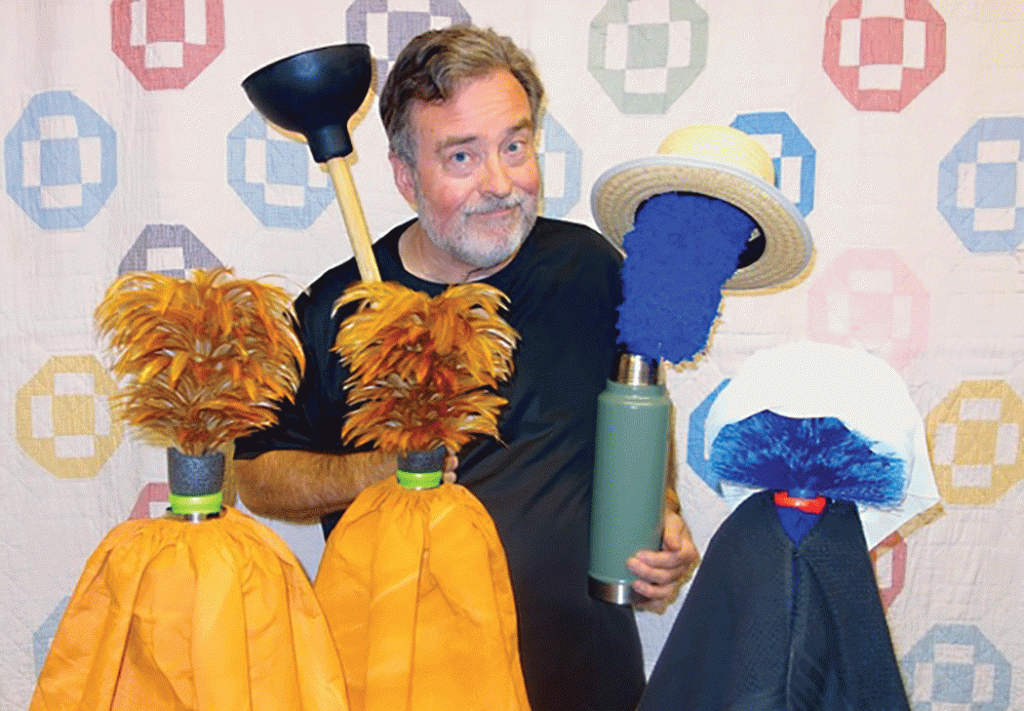
We’ve all heard stories about brave men and women who fought in wars to protect their country. It’s not often we’re taken inside the mind and heart of a young man who stood up for his belief in nonviolence—and refused to pick up a gun or put on a uniform.
Mary Swander, award-winning playwright, author, and Iowa’s poet laureate from 2009 to 2019, does just that in her groundbreaking new play, Coop: A Story of an Amish Conscientious Objector, now touring Iowa, and coming to the Fairfield Arts & Convention Center on April 25, 2026.
In a work of historical fiction based on oral histories, Swander dramatizes the trials of a young Amish man from Kalona, Iowa, who thought he was headed to the Rocky Mountains for a stint of public service as a smoke jumper in lieu of combat during World War II. Instead, he was led off the train by renegade soldiers and illegally imprisoned in a chicken coop with ten other men until the war’s end.
Unable to contact his family for two years, he writes imaginary letters to his mother, telling her of his bewilderment, fear, and ultimately, forgiveness. Through it all, he maintains extraordinary courage.
Puppets and Props
I was lucky enough to attend the debut performance of Coop at Kalona’s Hillcrest Academy last month, along with my friend Jean Greco. Jean is not only a fan of Swander’s, but she also organized community support for bringing Swander’s Map of My Kingdom, a production about farm succession planning, to Fairfield in 2019.
Despite Coop’s heart-wrenching subject matter, this play has its lighter moments, too. Jean and I watched veteran actor Rip Russell of Iowa City give a strenuous and moving solo performance—with a cast of props ranging from feather dusters to canning jar funnels to traffic cones. Using these everyday objects as puppets, Russell enacted the characters Jake encountered during his years of confinement.
“I have to be honest,” Jean confided to me after the show. “Going in, I didn’t think that in a play of such gravity, the use of household props in speaking roles would work. But halfway through, I found myself in sympathy with a character played by a duster. I was reminded once again of the genius of Mary Swander.”
During the question-and-answer session following the performance, Swander was joined by Russell, who has appeared in several Swander Woman Productions—including Driving the Body Back; Vang, a play about immigration; and Squatters on Red Earth, which explores the relationship between the Amana Colonies and the Meskwaki Indigenous people.

Swander related that the use of props came as a practical solution. Years earlier, she had slated Russell to star in Coop as Jake, the 20-year-old protagonist. The only problem? Russell is now in his 60s.
“It’s not a problem if you use puppets,” countered Monica Leo, director of Iowa’s Eulenspiegel Puppet Theater Company and a friend of Swander’s. When Swander protested that she is not crafty enough to make her own puppets, Monica suggested she gather everyday objects from her home to stand in for the puppets.
The result is an object-theater performance that makes you laugh and weep, even though the main character is an orange traffic cone with a blue duster for a head, topped by a straw hat.
“Tragicomedy is another theater genre I was aiming for,” Swander told the audience.
Russell agreed. “There’s a fine line between humor and heavy drama in this play. Of course, Mary has ruined me. Now I can’t walk into a home goods store without seeing all of Jake‘s family!”
A Little History
Like the character Jake, Mary Swander lives in Kalona, home of the largest settlement of Old Order Amish west of the Mississippi. She has shared her experiences among the Amish in her 1996 memoir, Out of this World: A Journey of Healing—and currently in her popular Buggyland podcast.
Swander’s Amish and Mennonite neighbors actively practice pacifism and nonresistance, following the Bible literally, including the commandment “Thou shalt not kill.” When faced with violence or assault, they turn the other cheek, as instructed in the New Testament.
Yet until ten years ago, Swander told the audience in Kalona, she had no idea what some young conscientious objectors (COs) in the Amish-Mennonite community had endured. That was the day she walked to the Amish country store near her home and spotted a mimeographed, hand-stapled pamphlet nestled between The Little Engine that Could and the Bible. It was an Amish man’s true story of being interred in a chicken coop during the war, told in his own voice.
“That story got me researching what young COs in Amish and Mennonite communities had to go through to stand up for their beliefs,” Mary said. “It was a rough history.”
Once word got around, her Amish neighbors started knocking on her door to tell stories of their own grandfathers and great-uncles who had faced mistreatment and even death when they refused to fight during the world wars of the last century.
“The nitty-gritty details in the play are drawn from all these oral histories,” said Swander. “I couldn’t have written this play without my Amish neighbors telling their stories.”
Swander also explained that during World War I, men who refused to pick up a gun or wear a uniform were often imprisoned or mistreated by other soldiers. In her play, the character of Jake’s Uncle Fred—who was enlisted in the army against his will during World War I and ended up in the hands of an abusive sergeant at Camp Dodge near Des Moines—is based on one of the oral histories her neighbors shared.
To end this mistreatment, the leaders of the Historic Peace Churches (Quakers, Church of the Brethren, and Anabaptists such as the Amish, Mennonites, and Hutterites) met with President Roosevelt in 1937. In 1940, the U.S. government created the draft category “conscientious objector” to give men who believed in nonviolence the opportunity to serve their country by fighting fires or working in mental hospitals or on farms.
Unfortunately, as we see in Swander’s play, not everyone was allowed to serve peaceably. Yet over and over, Jake and his Uncle Fred forgave the guards and others who mistreated them. For me, this mix of courage and forgiveness carries a poignant message for our times.
Swander shared her own heartfelt wish on opening night. “If we can create enough awareness, maybe it will rub off on others. Maybe as a society we can reflect on what we do to each other in war.”
If you are interested in scheduling a performance of Coop in your town, contact Janine Calsbeek at touringswp@gmail.com.
Linda Egenes and Jean Greco look forward to bringing Coop to Fairfield for the April 25, 2026, show. If you’d like to help, email Jean at jvangreco@gmail.com or Linda at linda@lindaegenes.com. Funding has been provided in part by a 2025 Cultural Trust Mini-Grant from the Fairfield Cultural Alliance, but sponsors are still needed.
Linda Egenes teaches in the MFA in Creative Writing at MIU and is the author of six books, including Visits with the Amish: Impressions of the Plain Life, University of Iowa Press, 2010. She is completing a work of fiction that portrays conscientious objectors in Kalona during WWII.
